Читать книгу An Autobiography - Elizabeth Butler - Страница 1
ОглавлениеFOREWORD
THE memoirs of a great artist must inevitably evoke the interest and appreciation of the initiated. But this book makes a wider appeal, written as it is by a woman whose career, apart from her art, has been varied and adventurous, who has travelled widely and associated, not only with the masters of her own craft, but with the great and eminent in many fields. It is, moreover, the revelation of a personality apart, at once feminine and virile, endued with the force engendered by unswerving adherence to lofty aims.
In this age of insistent ugliness, when the term “realism” is used to cloak every form of grossness and degeneracy, it is a privilege to commune with one who speaks of her “experiences of the world’s loveliness” and describes herself as “full of interest in mankind.” These two phrases, taken at random from the opening pages of “From Sketch Book and Diary,” seem to me eminently characteristic of Lady Butler and her work. She is a worshipper of Beauty in its spiritual as well as its concrete form, and all her life she has envisaged mankind in its nobler aspect.
At seven years old little Elizabeth Thompson was already drawing miniature battles, at seventeen she was lamenting that as yet she had achieved nothing great, and a very few years later the world was ringing with the fame of the painter of “The Roll Call.”
Through the accumulated interests of changeful years, charged for her with intense joy and sorrow, she has kept her valiant standard flying, in her art as in her life remaining faithful to her belief in humanity, using her power and insight for its uplifting. Not only has she depicted for us great events and strenuous action, with a sureness all her own, she has caught and materialised the qualities which inspire heroic deeds – courage, endurance, fidelity to a life’s ideal even in the moment of death. And all without shirking the dreadful details of the battlefield; amid blood and grime and misery, in loneliness and neglect, in the desperate steadfastness of a lost cause, her figures stand out true to themselves and to the highest traditions of their country.
During the recent world-upheaval Lady Butler devoted herself in characteristic fashion to the pursuance of her aims. Many of the subjects painted and exhibited during those terrible years still preached her gospel. She worked, moreover, with a twofold motive. Widow of a great soldier, she devoted the proceeds of her labours to her less fortunate sisters left impoverished, and even destitute, by the War.
“L’artiste donne de soi,” said M. Paderewski once.
Lady Butler has always given generously of her best, and perhaps this book of memories, intimate and characteristic, this record of wide interests and high endeavour, full of picturesque incident and touched with delicate humour, is as valuable a gift as any that she has yet bestowed.
M. E. Francis.
AN AUTOBIOGRAPHY
ELIZABETH BUTLER
My Friends: You must write your memoirs.
I: Every one writes his or her memoirs nowadays. Rather a plethora, don’t you think? An exceedingly difficult thing to do without too much of the Ego.
My Friends: Oh! but yours has been such an interesting life, so varied, and you can bring in much outside yourself. Besides, you have kept a diary, you say, ever since you were twelve, and you have such an unusually long memory. A pity to waste all that. You simply must!
I: Very well, but remember that I am writing while the world is still knocked off its balance by the Great War, and few minds will care to attune themselves to the Victorian and Edwardian stability of my time.
My Friends: There will come a reaction.
